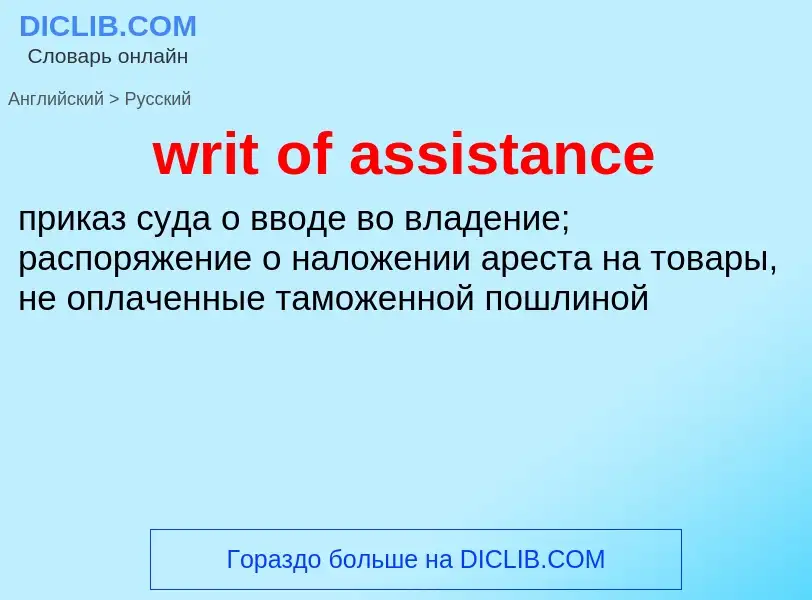Μετάφραση και ανάλυση λέξεων από την τεχνητή νοημοσύνη ChatGPT
Σε αυτήν τη σελίδα μπορείτε να λάβετε μια λεπτομερή ανάλυση μιας λέξης ή μιας φράσης, η οποία δημιουργήθηκε χρησιμοποιώντας το ChatGPT, την καλύτερη τεχνολογία τεχνητής νοημοσύνης μέχρι σήμερα:
- πώς χρησιμοποιείται η λέξη
- συχνότητα χρήσης
- χρησιμοποιείται πιο συχνά στον προφορικό ή γραπτό λόγο
- επιλογές μετάφρασης λέξεων
- παραδείγματα χρήσης (πολλές φράσεις με μετάφραση)
- ετυμολογία
writ of assistance - translation to ρωσικά
Ορισμός
.
Βικιπαίδεια
A writ of assistance is a written order (a writ) issued by a court instructing a law enforcement official, such as a sheriff or a tax collector, to perform a certain task. Historically, several types of writs have been called "writs of assistance". Most often, a writ of assistance is "used to enforce an order for the possession of lands". When used to evict someone from real property, such a writ is also called a writ of restitution or a writ of possession. In the area of customs, writs of assistance were a product of enactments of the British Parliament beginning with the Customs Act of 1660 (12 Charles II c.11, sec. 1) though the first mention of the phrase was in the follow-up Customs Act of 1662 (14 Charles II, c.11, sec.4). The writs of assistance were issued by the Court of Exchequer to help customs officials search for smuggled goods. These writs were called "writs of assistance" because they called upon sheriffs, other officials, and loyal subjects to "assist" the customs official in carrying out his duties.
In general, customs writs of assistance served as general search warrants that did not expire, allowing customs officials to search anywhere for smuggled goods without having to obtain a specific warrant. These writs became controversial when they were issued by courts in British America between 1755 and 1760 (then mirroring like writs having previously been issued, and being enforced, in the motherland by Britain's Exchequer Court), especially the Province of Massachusetts Bay. Controversy over these general writs of assistance inspired the Fourth Amendment to the United States Constitution, which forbids general search warrants in the United States of America. Though generally these colonial writs were no more onerous than the ones enforced in Britain, a fallacious 1760 London Magazine article asserted the writs issued in the motherland "...were specific, not general" thereby generating the perception in the colonies that the colonists were being treated unfairly. John Adams was to later assert that the ensuing court battle was the "seeds of the American Revolution."

